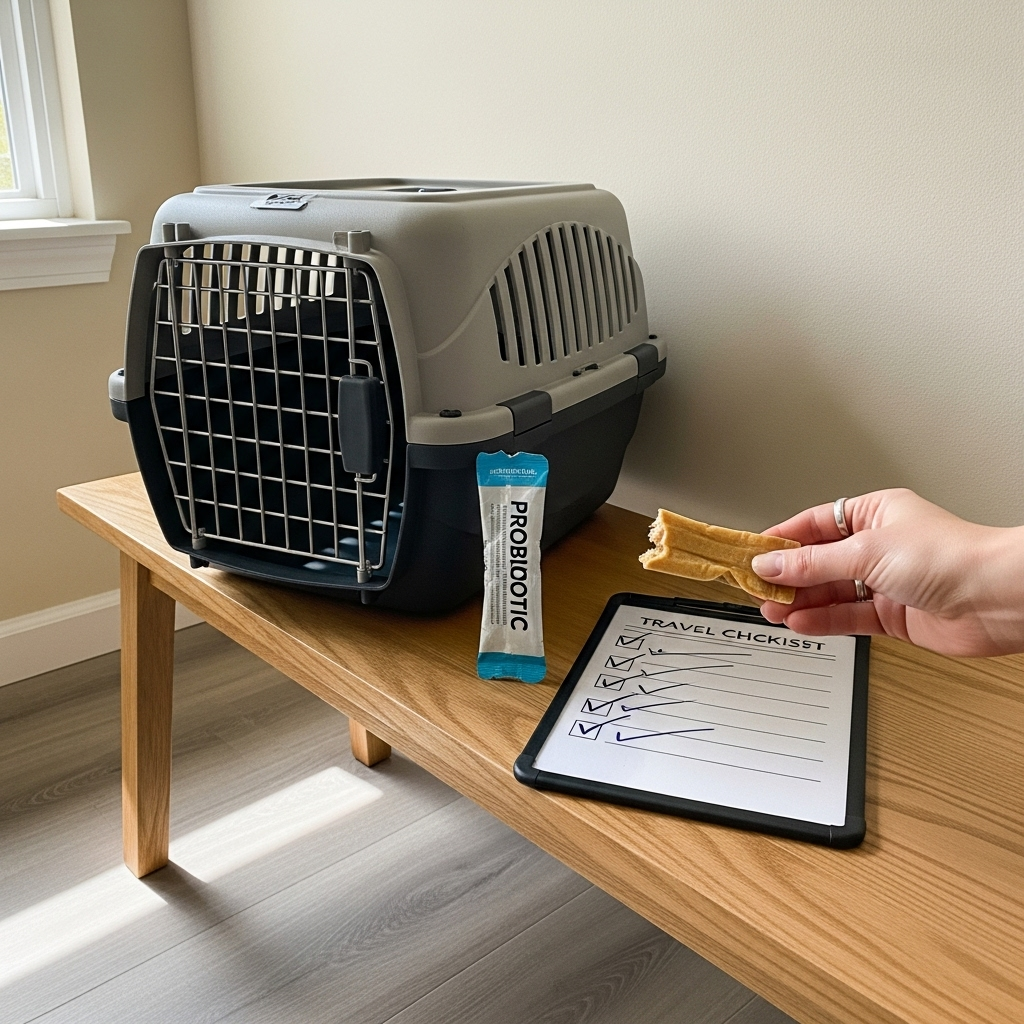Probiotics for Travel-Stressed Cats: Prep & Timing

Travel can be stressful for many cats, and stress often shows up as digestive upset — vomiting, diarrhea, decreased appetite or irregular stools. Probiotics are live microorganisms intended to support a healthy gut microbiome and may help reduce or shorten stress-related gastrointestinal (GI) signs. This article explains what to consider when preparing a travel plan that includes probiotics, practical timing and dosing tips, safety notes, and realistic expectations so you can travel with greater confidence.
How probiotics may help a stress-prone cat
Stress affects the gut through the “gut–brain axis,” altering motility, gut permeability and the balance of friendly and opportunistic bacteria. By supporting beneficial bacteria, certain probiotics can:
- Help stabilize stool consistency and reduce the duration of stress-related diarrhea.
- Support normal digestion and appetite recovery after stressful events.
- Potentially reduce inflammatory signals in the gut that contribute to GI symptoms.
It’s important to note that probiotics are not sedatives or anti-anxiety medications — they target gut health and may indirectly help with some stress consequences.
Which probiotic types and strains are commonly used for cats
Not all probiotics are the same. Strain and formulation matter. Some strains have more evidence in cats and dogs than others:
- Saccharomyces boulardii — a probiotic yeast; good evidence for preventing and treating acute diarrhea and helpful during short-term stress-related GI upset.
- Enterococcus faecium (e.g., certain veterinary strains) — commonly used in cat/dog products for stool consistency and general support.
- Lactobacillus species (several strains) — often included to support digestion and balance.
- Multi-strain blends / synbiotics — combine probiotics with prebiotics (fiber that feeds beneficial bacteria); may offer broader support but choose products designed for cats.
When choosing a product, pick one labeled for cats (or cats and dogs) and showing strain-specific information. Avoid assuming a human product will be appropriate without veterinary guidance.
Timing: when to start, during travel, and after
Start before travel
Ideally start probiotics at least 1–2 weeks before your trip. This gives time for the product to influence the gut environment and may reduce the chance of acute diarrhea once travel begins. For best results, starting 2–4 weeks before travel is reasonable when possible.
During travel
Continue the probiotic throughout travel. Give the usual daily dose according to the product instructions. If your cat uses a short-course supplement like S. boulardii for acute issues, follow the label or your veterinarian’s guidance — some benefits can appear within a few days for diarrhea control.
After travel
Keep the probiotic going for at least several days to a week after travel, or longer if your cat’s stool or appetite remains unsettled. If GI signs persist, contact your veterinarian.
Practical tips for giving probiotics to a picky or anxious cat
- Use a palatable form: paste, powder to mix into a small amount of wet food, or treats specifically formulated for cats.
- If using capsules, open them and mix the contents into a tiny taste of wet food or a lickable treat. Verify the product’s form allows this (some require refrigeration or have specific handling).
- For carrier or clinic travel, consider giving the dose before leaving home so your cat already has it onboard — but continue regular dosing during the trip.
- Keep feeding routine and the cat’s favorite food available during travel; sudden diet changes are a common cause of GI upset.
Storage, dosing, and interactions — what to watch for
Follow the product label for storage. Some probiotics are shelf-stable, others require refrigeration to maintain live organisms. Note the expiration date and guaranteed potency (CFU) through the labeled date.
- Dosing: follow the manufacturer’s or your veterinarian’s instructions. Cat-specific products will list appropriate doses. If you’re unsure, check with your vet rather than guessing a CFU amount.
- Antibiotics: if your cat is receiving antibiotics, separate doses by 2–3 hours if possible. Certain probiotics (like S. boulardii) are yeast-based and not affected by antibiotics.
- Immune suppression: cats on chemotherapy or strong immunosuppressants should only receive live probiotics under veterinary guidance because of a very small infection risk.
When to contact your veterinarian
Contact your vet if your cat has:
- Severe or bloody diarrhea
- Repeated vomiting or signs of dehydration
- Severe lethargy, fever, or abdominal pain
- Underlying immune disorders or recent surgery
Probiotics can be supportive but are not a substitute for veterinary care when signs are serious.
Pros and Cons
| Pros | Cons |
|---|---|
| Supports stool consistency, may shorten stress-related diarrhea; generally safe for healthy cats; easy to give in palatable forms. | Not an immediate calming agent; benefits vary by product and cat; live probiotics rarely can cause issues in immunocompromised pets; product quality varies. |
FAQ
Q: How soon before travel should I start a probiotic?
A: Start at least 1–2 weeks before travel if possible; 2–4 weeks is better for more consistent effects. For acute diarrhea during travel, some products (like S. boulardii) can help quickly, but plan ahead if you can.
Q: Can probiotics calm my cat’s nerves?
A: Probiotics are not sedatives. They may reduce stress-related GI symptoms through the gut–brain axis, but they do not replace behavior modification or veterinary-prescribed anti-anxiety medications when needed.
Q: Can I give my cat a human probiotic?
A: It’s safer to use a product formulated for cats or labeled for pets because dosages and strains differ. If only a human product is available, check the strain, dose and with a veterinarian before using it in your cat.
Q: Are there side effects?
A: Most side effects are mild and temporary, such as a little gas or looser stools when starting. Stop use and contact your vet if symptoms worsen or if your cat is immune-compromised.
Key Takeaways
- Probiotics can help reduce or shorten stress-related digestive issues in traveling cats, but they are not sedatives.
- Start probiotics at least 1–2 weeks before travel (2–4 weeks preferred) and continue during and after the trip as needed.
- Choose cat-specific products or strains with evidence (e.g., S. boulardii, certain Enterococcus/Lactobacillus strains) and follow product storage/dosing instructions.
- Separate probiotic dosing from antibiotics by a few hours; consult your vet if your cat is immunocompromised or on complex medications.
- If severe GI signs or systemic illness occur, seek veterinary care—probiotics are supportive, not curative for serious conditions.
Always check with your veterinarian before starting any new supplement, especially if your cat has pre-existing medical conditions, is on medications, or is pregnant, nursing, very young, or elderly.
Disclaimer: This information is educational and not a substitute for professional veterinary advice. For diagnosis or treatment of health issues, consult your veterinarian.

Leave a Reply